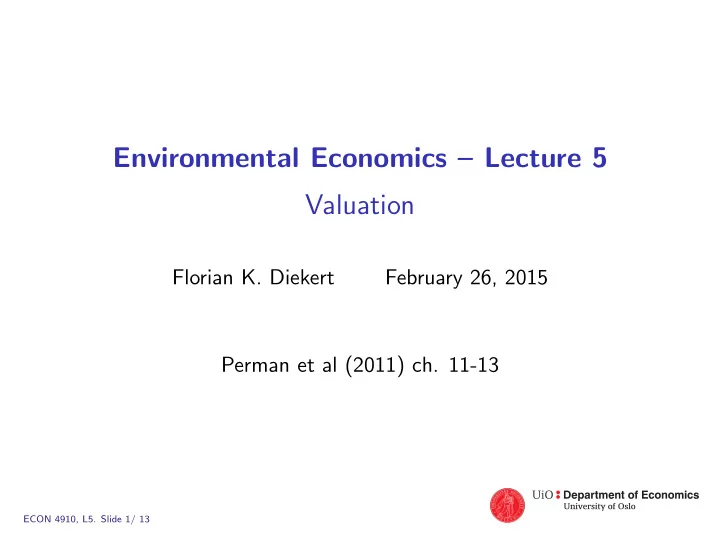

Environmental Economics – Lecture 5 Valuation Florian K. Diekert February 26, 2015 Perman et al (2011) ch. 11-13 ECON 4910, L5. Slide 1/ 13
Preview lecture 5 1. Theory ◮ Categories of environmental benefits ◮ WTP and WTA 2. Practice ◮ Stated preference methods ◮ The method of “contingent valuation” (CV) ◮ Discussion: ( http: //www.aeaweb.org/articles.php?doi=10.1257/jep.26.4 ) ◮ Revealed preferences ◮ Travel cost method ◮ Hedonic pricing ◮ Production function based techniques ECON 4910, L5. Slide 2/ 13
Valuation: Theory ECON 4910, L5. Slide 3/ 13
Categories of environmental benefits In the old edition of the Perman book (2003), there were a lot of acronyms, summarized in two equations: EC = UV + EV + OV + QOV TV = CUV + NCUV + NUV ECON 4910, L5. Slide 4/ 13
Willingness-to-pay & willingness-to-accept Assume that quantity/quality of environmental good e can be treated as an argument in a well- behaved utility function. The individual cannot choose level of e. y is income. u = u(y, e) e 0 e 1 At A, WTP for e improvement = BC is Compensating Surplus, CS At A, WTA in lieu of e improvement = DA is Equivalent Surplus, ES e 1 e 0 At B, WTP to avoid deterioration = BC is Equivalent Surplus, ES At B, WTA compensation for deterioration = DA, Compensating Surplus, CS Figure: Slide taken from Perman’s webpage http://personal.strath.ac.uk/r.perman/ppts.htm ECON 4910, L5. Slide 5/ 13
Willingness-to-pay & willingness-to-accept ECON 4910, L5. Slide 6/ 13
Compensating and Equivalent variaton ◮ Compensating variation is the change in income that would compensate for the price change ◮ Equivalent variation is the change in income that would be equivalent to the price change ECON 4910, L5. Slide 7/ 13
Compensating and Equivalent variaton ◮ Compensating variation is the change in income that would compensate for the price change ◮ Equivalent variation is the change in income that would be equivalent to the price change Two necessary conditions for environmental quality changes to be approximately identified by price changes in demand functions: ◮ Non-essentialness ◮ Weak complementarity ECON 4910, L5. Slide 7/ 13
Valuation: Practice ECON 4910, L5. Slide 8/ 13
Stated preference methods: Contingent Valuation Excerpt of NOAA-panel recommendation: ◮ Sample from entire affected population ◮ Personal interview ◮ Pre-testing ◮ Referendum format ◮ WTP instead of WTA ◮ Reminder of undamaged substitutes ◮ ‘No-answer’ option available ECON 4910, L5. Slide 9/ 13
Contingent Valuation: Discussion ECON 4910, L5. Slide 10/ 13
Revealed preference methods 1. Travel cost method ECON 4910, L5. Slide 11/ 13
Revealed preference methods 1. Travel cost method 2. Hedonic pricing ECON 4910, L5. Slide 11/ 13
Revealed preference methods 1. Travel cost method 2. Hedonic pricing 3. Production function based techniques ECON 4910, L5. Slide 11/ 13
Review lecture 5 1. Theory ◮ Categories of environmental benefits ◮ WTP and WTA 2. Practice ◮ Stated preference methods (in part. “contingent valuation”) ◮ Revealed preferences: Travel cost method, Hedonic pricing, Production function based techniques ECON 4910, L5. Slide 12/ 13
Preview next lecture 1. A heuristic definition of cost-benefit analysis 2. Detour: The moral of choosing A over B 3. Cost-benefit analysis in a static and certain world ◮ Tests for marginal and non-marginal projects ◮ CBA and social welfare functions 4. Dynamic aspects 5. Accounting for uncertainty, risk, and irreversibility ECON 4910, L5. Slide 13/ 13
Recommend
More recommend